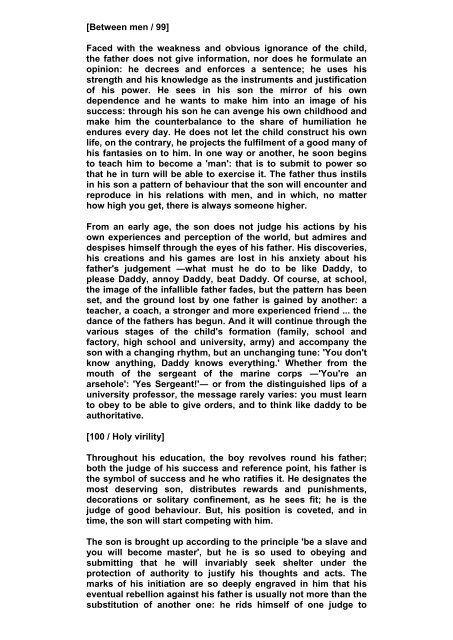emmanuel reynaud holy virility the social construction of masculinity
emmanuel reynaud holy virility the social construction of masculinity
emmanuel reynaud holy virility the social construction of masculinity
Create successful ePaper yourself
Turn your PDF publications into a flip-book with our unique Google optimized e-Paper software.
[Between men / 99]<br />
Faced with <strong>the</strong> weakness and obvious ignorance <strong>of</strong> <strong>the</strong> child,<br />
<strong>the</strong> fa<strong>the</strong>r does not give information, nor does he formulate an<br />
opinion: he decrees and enforces a sentence; he uses his<br />
strength and his knowledge as <strong>the</strong> instruments and justification<br />
<strong>of</strong> his power. He sees in his son <strong>the</strong> mirror <strong>of</strong> his own<br />
dependence and he wants to make him into an image <strong>of</strong> his<br />
success: through his son he can avenge his own childhood and<br />
make him <strong>the</strong> counterbalance to <strong>the</strong> share <strong>of</strong> humiliation he<br />
endures every day. He does not let <strong>the</strong> child construct his own<br />
life, on <strong>the</strong> contrary, he projects <strong>the</strong> fulfilment <strong>of</strong> a good many <strong>of</strong><br />
his fantasies on to him. In one way or ano<strong>the</strong>r, he soon begins<br />
to teach him to become a 'man': that is to submit to power so<br />
that he in turn will be able to exercise it. The fa<strong>the</strong>r thus instils<br />
in his son a pattern <strong>of</strong> behaviour that <strong>the</strong> son will encounter and<br />
reproduce in his relations with men, and in which, no matter<br />
how high you get, <strong>the</strong>re is always someone higher.<br />
From an early age, <strong>the</strong> son does not judge his actions by his<br />
own experiences and perception <strong>of</strong> <strong>the</strong> world, but admires and<br />
despises himself through <strong>the</strong> eyes <strong>of</strong> his fa<strong>the</strong>r. His discoveries,<br />
his creations and his games are lost in his anxiety about his<br />
fa<strong>the</strong>r's judgement ―what must he do to be like Daddy, to<br />
please Daddy, annoy Daddy, beat Daddy. Of course, at school,<br />
<strong>the</strong> image <strong>of</strong> <strong>the</strong> infallible fa<strong>the</strong>r fades, but <strong>the</strong> pattern has been<br />
set, and <strong>the</strong> ground lost by one fa<strong>the</strong>r is gained by ano<strong>the</strong>r: a<br />
teacher, a coach, a stronger and more experienced friend ... <strong>the</strong><br />
dance <strong>of</strong> <strong>the</strong> fa<strong>the</strong>rs has begun. And it will continue through <strong>the</strong><br />
various stages <strong>of</strong> <strong>the</strong> child's formation (family, school and<br />
factory, high school and university, army) and accompany <strong>the</strong><br />
son with a changing rhythm, but an unchanging tune: 'You don't<br />
know anything, Daddy knows everything.' Whe<strong>the</strong>r from <strong>the</strong><br />
mouth <strong>of</strong> <strong>the</strong> sergeant <strong>of</strong> <strong>the</strong> marine corps ―'You're an<br />
arsehole': 'Yes Sergeant!'― or from <strong>the</strong> distinguished lips <strong>of</strong> a<br />
university pr<strong>of</strong>essor, <strong>the</strong> message rarely varies: you must learn<br />
to obey to be able to give orders, and to think like daddy to be<br />
authoritative.<br />
[100 / Holy <strong>virility</strong>]<br />
Throughout his education, <strong>the</strong> boy revolves round his fa<strong>the</strong>r;<br />
both <strong>the</strong> judge <strong>of</strong> his success and reference point, his fa<strong>the</strong>r is<br />
<strong>the</strong> symbol <strong>of</strong> success and he who ratifies it. He designates <strong>the</strong><br />
most deserving son, distributes rewards and punishments,<br />
decorations or solitary confinement, as he sees fit; he is <strong>the</strong><br />
judge <strong>of</strong> good behaviour. But, his position is coveted, and in<br />
time, <strong>the</strong> son will start competing with him.<br />
The son is brought up according to <strong>the</strong> principle 'be a slave and<br />
you will become master', but he is so used to obeying and<br />
submitting that he will invariably seek shelter under <strong>the</strong><br />
protection <strong>of</strong> authority to justify his thoughts and acts. The<br />
marks <strong>of</strong> his initiation are so deeply engraved in him that his<br />
eventual rebellion against his fa<strong>the</strong>r is usually not more than <strong>the</strong><br />
substitution <strong>of</strong> ano<strong>the</strong>r one: he rids himself <strong>of</strong> one judge to
















